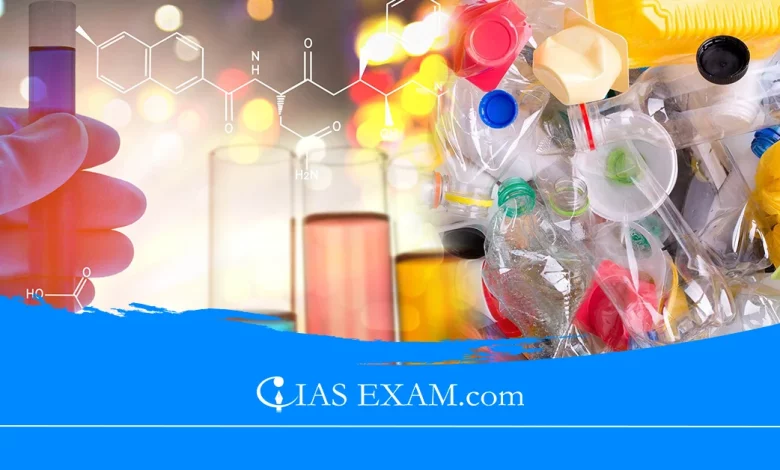
Context
A recent report released from European scientists says there are 16,000 chemicals in plastic materials around the world.
About
- Health effects: Plastic chemical compounds can leach into water and food and have been connected to destructive health consequences.
- Full life cycle of plastics: To robustly resolve plastic pollutants, there may be a need to have a look at the whole life cycle of plastics and there is a need to deal with the chemicals issue.
- Recycling and reuse: While the plastics industry has stated any worldwide treaty must promote recycling and re-use of plastic, only addressing plastic waste doesn’t go far enough to protect people, the report said.
- Greater transparency: Scientists flagged the want for greater transparency on what chemical compounds — inclusive of additives, processing aids, and impurities — are going into plastics – which includes recycled products.
- A region of the diagnosed chemical compounds lack fundamental reports on their simple chemical identification, the report said.
- Chemical complexity: At the middle of the hassle is the chemical complexity of plastics. Often producers don’t really understand which type of chemical substances they’ve in their products and that comes from very complex value chains.
- Lack of regulation: Only 6% of the chemicals located in plastics are regulated across the world. Without regulatory pressure, there is no motivation to reveal what’s in the plastics, the report stated.
Plastic pollutants in India: Status
- Huge waste technology: Increased substantially from 15.9 lakh tonnes per annum (TPA) in 2015-16 to 41.2 lakh TPA in 2020-21.
- Inadequate waste control infrastructure: Data from 2019-20 shows that 50% of the whole plastic waste within the country (34.7 lakh TPA) remained unutilised, leading it to pollute air, water and soil, and ultimately have an effect on human health.
- Data gap: The Public Account Committee noted a huge data gap, observing from CAG’s 2022 audit findings that many state pollution control boards (SPCBs) did now not provide data on plastic waste generation for the period 2016-18 to the CPCB and there have been inconsistencies in data shared by urban local bodies (ULBs) with SPCBs.
- Recycling inefficiencies: The present recycling system is basically informal and unregulated, leading to low-best recycled plastic and restrained environmental blessings.
Measures required
- Reliable evaluation technique: Underlining gaps in data, the panel expressed the need to have a “dependable evaluation” of the amount of plastic waste being generated and said it ought to be the first step towards managing the issue effectively.
- Mandatory reporting: It endorsed “mandatory” reporting of data on line on the national dashboard.
- Comprehensive policy: A comprehensive policy is required for containing pollutants caused by plastics.
- Alternatives: It discovered that “finding a cost effective and dependable alternative to plastic” by providing a budget for R&D became a prerequisite for its elimination.
- Awareness: Spreading consciousness about eco-friendly alternatives and ill-effects of SUP is crucial.
- Other measures: Making implementing companies responsible, promoting use of recycled plastic material and increasing recycling centers can be taken to efficiently implement the ban on SUP on ground.
Indian Government initiatives
- Plastic Waste Management Rules, 2016: This regulation prohibits manufacture, sale, and use of positive single-use plastic objects like bring bags, straws, and cups.
- Ban on SUP: The ministry of environment had banned difficult-to-acquire/recycle, single use plastic (SUP) items with effect from July 1, 2022.
- Prohibition: Prohibited manufacture, import, sale and use of plastic carry bags thinner than 120 microns from December 31 2022.
- National Policy on Solid Waste Management, 2016: This policy emphasizes waste minimization, supply segregation, and clinical processing, along with plastic waste.
- EPR rules: It also notified extended producer responsibility (EPR) regulations to streamline series and recycling of plastic waste.
- Swachh Bharat Abhiyan: This mission includes promoting waste segregation at supply, composting biodegradable waste, and setting up waste processing facilities, contributing to plastic waste management indirectly.
- Indian Swachhata League: It is an particular teens-led, inter-metropolis initiative to sell engagement of younger human beings within the Swachata related activities.
Way Ahead
- Addressing plastic waste pollution calls for a multi-pronged method involving government, industry, civil society, and individual citizens.
- Effective implementation of existing regulations, technological advancements, and a shift closer to a circular economy are essential for a cleaner and healthier environment.
Source: The Hindu
UPSC Mains Practice Question
Q.Plastic pollution is the most widespread issue affecting the environment. Discuss. (250 Words)





.png)



